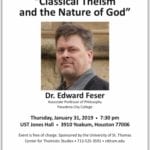Chance, Determinism, and Providence

I’m currently reading Yves Simon’s Foresight and Knowledge (Prévoir et savoir), a work written in 1944 on philosophy of science.
The first chapter makes up a third of the book. There he considers what chance is (and is not), gives a few examples, and shows chance’s relation to divine providence. In this post, I will attempt to summarize this section of the work.
1. Chance

First, Simon disposes with a bad attempt to define chance. He observes that many today want to define chance as something that happens unpredictably, but this is not the core of what chance is, although it is related. In this view, no events are unpredictable in themselves (for everything is determined), and the notion of chance would be altogether meaningless if an intellect were capable of grasping all causes in nature. While this seems fitting, this is a bad definition.
Instead, Simon proposes Aristotle’s definition of
Simon acknowledges however that the predictability of a fact, even though it does not alter the relation of this fact to its real causes, deeply modifies the fact’s human meaning. Insofar as events are predictable, so far do we consider people responsible.
2. Chance and Determinism

Next, Simon, an Aristotelian-Thomist, moves to consider how chance agrees and disagrees with determinism. On the one hand, the notion of an absolute chance, independent of all determinism is a contradictory fiction. This is because the intersection of two causal lines (each of which is moving in a
Aristotle’s theory of chance not only presupposes the *determination* of causal lines whose encounter is a chance event, but also holds that the chance event must occur inevitably, necessarily, and determinately, as soon as the causes from which it will result are actually posited. In this
But material necessity is not the same as strictly, for formal necessity, because for Aristotle, only what happens per se has
A chance event has several real causes whose plurality is irreducible. The event cannot be a REAL cause (although
Some of you reading might have a gripe at this point. Simon seems to be speaking like human intention really matters. But science, on might complain, if it is to be objective, ought not to care about intentions. And here we have another major difference between modern and ancient science. In fact, for Aristotle, the most explanatory cause to grasp in relation to an
We return to the point: the mind has the ability to make one what is not one in reality. For example, you can imagine
Simon goes on to explain that every cause is identical with some aspect of its effect. The effect of a car arriving home from work is explainable by the fact of the driver directing it home, and the likewise the arrival of each ball at the screen is explained by the player directing it there. The effect of arriving at the screen has an identity with the
The rationalistic assumption of universal intelligibility (which requires the elimination of chance) eliminates this plurality. This is why, as Aristotle noted in the beginning of the Physics, Book I, Chapter 2, rationalism implies a theory of
Simon tests another scenario, a scenario that might be brought up as an objection to this ability to explain, to see if the above holds. An old man slips on an icy street and is hit by a bus. There is seems to be no connection between: 1) construction of the street on this hill, 2) causes that let the old man cross the street at that very time, and 3) causes that determined the formation of ice on that day. This is should be a chance event, yet people think they can explain this, and therefore, determinists would claim, it is not a chance even.
How would they explain it? The family seems to be able to explain this by a single unified fact: the obstinate old gentleman was warned to give up his walk. The driver that hit him seems to be able to do the same: the driver knew that it would be risky ice, but didn’t detour. The city seems to be able to explain it by a single fact: an employee was ordered to spread ashes, but the employee skipped that street. Each fact seems to explain the scenario, does it not?
Simon responds that these are practical explanations, not theoretical explanations. We would never have had the illusion that we could explain (truly) a chance event if we had from the beginning possessed a clear notion of what practical explanation is. (14-15) Theoretical thought endeavors to know what things are, and in order to know them perfectly, needs to know them through their causes – to explain them (14) Practical thought, on the other hand, wants to know what we have to do in order to attain our ends, what we should have done in order not to fail of our ends, and what we must do in the future in order to stay along the path that leads to our ends. A science with practical ends is quite naturally only concerned with the material necessity, because it enables us to answer practical questions like: “What must we do?”; “What should we have done?” “What shall we do?” But answering these questions does not answer the theoretical question. Likewise the above explanations for the family, the driver, and the department, make sense, but do not answer the theoretical question.
To answer the theoretical question, it would be necessary to choose among the heterogenous and unrelated causes that the family of the victim, the conscience of the driver, and the head of the state department assign to the accident. Does it lie in any of these? (15) It is impossible to make a choice between these three. They are all necessary conditions, but no one stands out. Nor can it be said that the accident is explained by all three because these together do not make unified whole, and more of them might even be found. Here an insight which was practical was mistakenly applied to the theoretical question.
3. Chance and Providence
The illusion that chance can be explained, Simon says, is nicely balanced by another aspect of our psychology: “the feeling of admiration and awe that the contemplation of a fortuitous event brings about in us.” For example, lovers are bewildered when they think of all the many “chance” encounters that were needed to bring about the masterpiece that is their love. Inasmuch as the causes of the fortuitous (for example their meeting in the first place) are several and are not unified, they explain nothing and leave us to our worries, unsatisfied.
The mind, tired of seeking an explanation for the fortuitous events, may only find peace in the thought of Providence: that everything is ultimately unified and has a purpose. The bewilderment of chance, whether joyful or sad, often naturally ends in an act of adoration (15). Why adoration? It is only on the level of the First Cause, (the level of Divine decree) which organizes chance in a design where the plurality of causes is finally unified, and all events make sense.
Does this claim that all is unified, an assertion of universal necessity, in the end amount to denying chance, just as the Parmenidean or rationalist? Aquinas would answer in the negative. The final unification of all events does not take place within the natural world, but rather within its creator, which is transcendent to it. From the perspective of God (seperate from the natural world), no, chance does not exist, but from the perspective of the proper cause (nature), chance does.
It is the distinction of the supreme being to move beings according to the mode of operation that befits them, while respecting their natures. “Under the influence of the first cause, always infallibly effective, the natural event takes place naturally, the free event freely, the contingent event contingently, and the fortuitous event fortuitously.” With regard to the real existence of chance, the question concerns not how the plurality of causal lines is finally unified, but rather, whether this final unification takes place in nature, or only in the mind of God.
To answer the question: In one view, that of the determinist, the notion of natural necessity implies that the reduction of the causes involved in bringing about the fortuitous event occurs with in the natural world, and by natural causes alone. If this is to be true, the reality of chance must disappear. But the theory of providential government holds that “this ultimate reduction takes place only on the level of the First Cause, and thus the fortuitous remains, and retains all its mystery, though it is no longer burdened with dread.” (16) Aquinas’ commentary on this subject can be found in: Summa Contra Gentiles (SCG), III, 74; Summa Theologiae (ST), I, 18, 8.; I, 22, 2, ad. 2; I, 103, 7, ad. 2; Cajetan commments on this in his commentary on ST I, 22, 2 ad 1.





